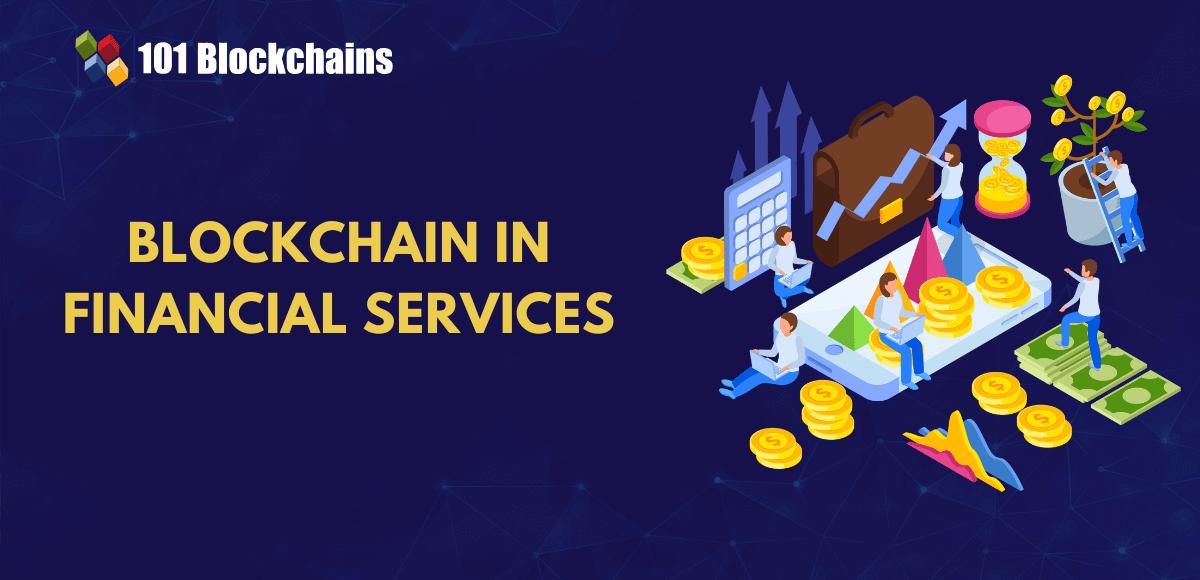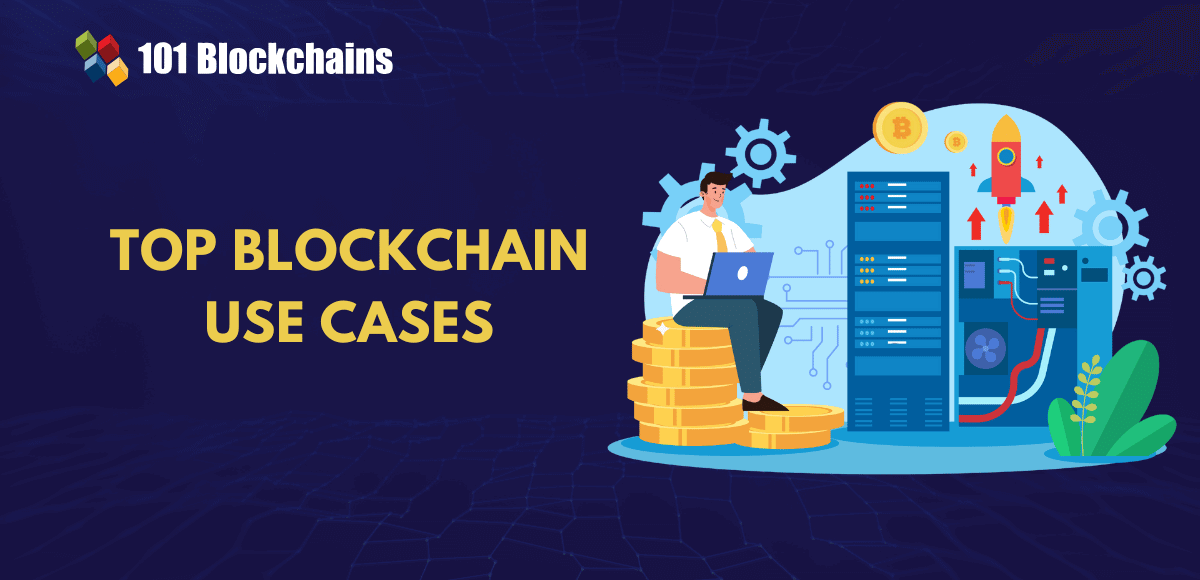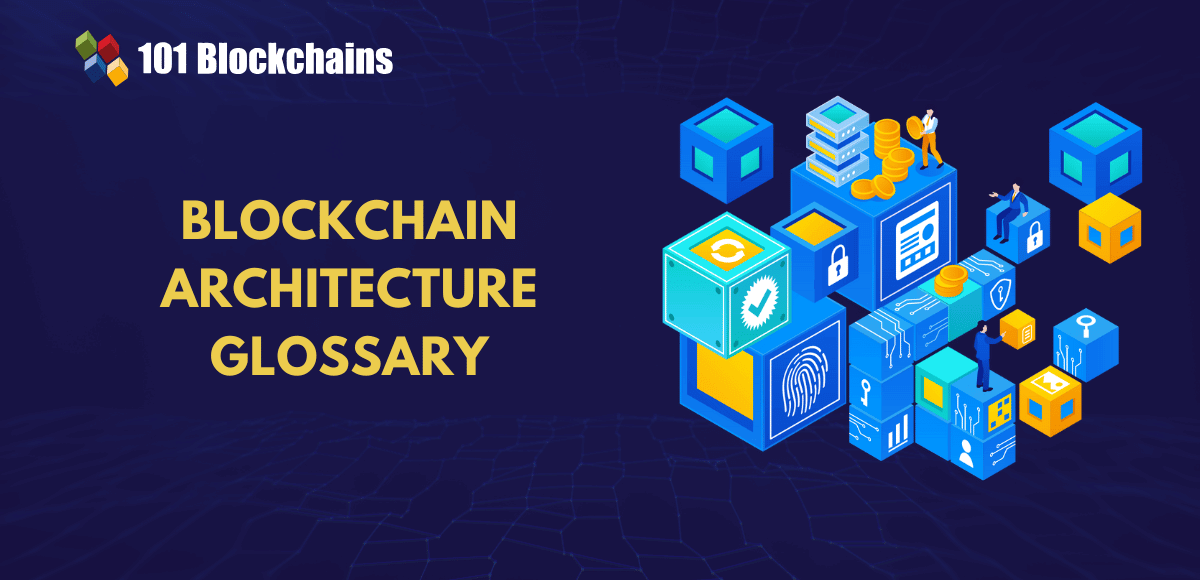Learn how blockchain truly works, master key definitions, and uncover what makes smart contracts so "smart." Dive into the fundamentals, gain valuable insights, and start your blockchain journey today!
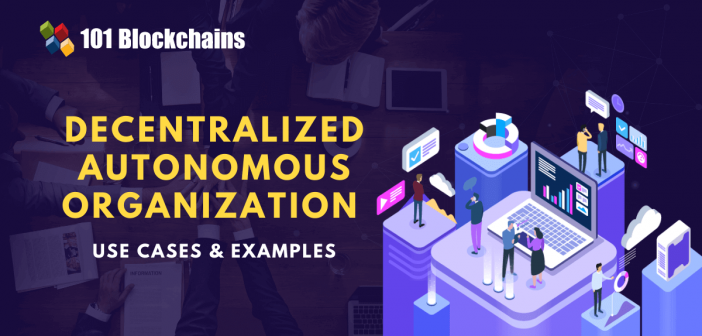
- Blockchain
James Howell
- on April 28, 2022
Top Decentralized Autonomous Organization (DAO) Use Cases & Examples
DAOs, or Decentralized Autonomous Organizations, have emerged as one of the biggest innovations in the blockchain ecosystem recently. Decentralized autonomous organizations have offered productive and secure platforms for working with people sharing the same interests worldwide. You can think of DAOs as internet businesses under collective ownership and management of the members. The explosive growth of DAOs in recent years has spurred a lot of interest in top DAO use cases and examples.
Enterprises and individuals seek clarity on how decentralized autonomous organizations have climbed the heights of popularity in a short period of time. As a matter of fact, Constitution DAO successfully raised over $47 million within 72 hours with the goal of purchasing a rare private copy of the US Constitution. Even if the DAO failed at the auction, it definitely proved how DAOs could serve revolutionary transformations in the crypto space.
Are DAOs only meant for crowdfunding? While crowdfunding is obviously a significant entry among best DAO use cases, you can discover many other possible use cases. On top of it, the examples of decentralized autonomous organizations also shed light on the different ways you can use them. The following discussion offers you an overview of use cases and examples of DAOs to understand their value.
Excited to develop fluent knowledge of the DAO ecosystem? Enroll Now in DAO Fundamentals Course!
What is a DAO?
Before you reflect on DAO examples, you must have a brief overview of their definition. A decentralized Autonomous Organization is basically a smart contract that features in-built capabilities for collectively managing the code. DAOs don’t follow the traditional governance models relying on a limited group.
On the contrary, DAOs leverage a set of coded rules which are enforced by every computer running the smart contract. All the members of a DAO can access information about the organization’s actions and finances alongside exerting their stake in the decision-making processes. At the same time, DAOs also ensure the benefits of lower entry barriers and easy global access with anonymous operations.
Working of DAO
The working of a decentralized autonomous organization depends a lot on the smart contract. You can uncover more about decentralized autonomous organization examples with a comprehensive impression of how DAOs work. The smart contract in DAOs helps in defining the organization’s rules alongside controlling the organization’s treasury.
Members of the DAO can change the rules in the code only by a vote. The rules and logic in the smart contract code prevent unauthorized expenses from the organization’s treasury and other malicious actions. Without any centralized authority, the organization itself takes decisions collectively. Based on these functionalities, DAOs can offer vital support for many use cases.
What Can a DAO Be Used For?
The unique decentralized and autonomous design of DAOs is one of the prominent highlights which makes them suitable for many use cases. Even in the initial stages of development, you can find many DAOs operational today, with one of the popular examples being MakerDAO. So, what is the use of DAO right now? Can you implement decentralized autonomous organizations for any activity with value? Here are some of the notable use cases of DAOs that shed light on their practical value.
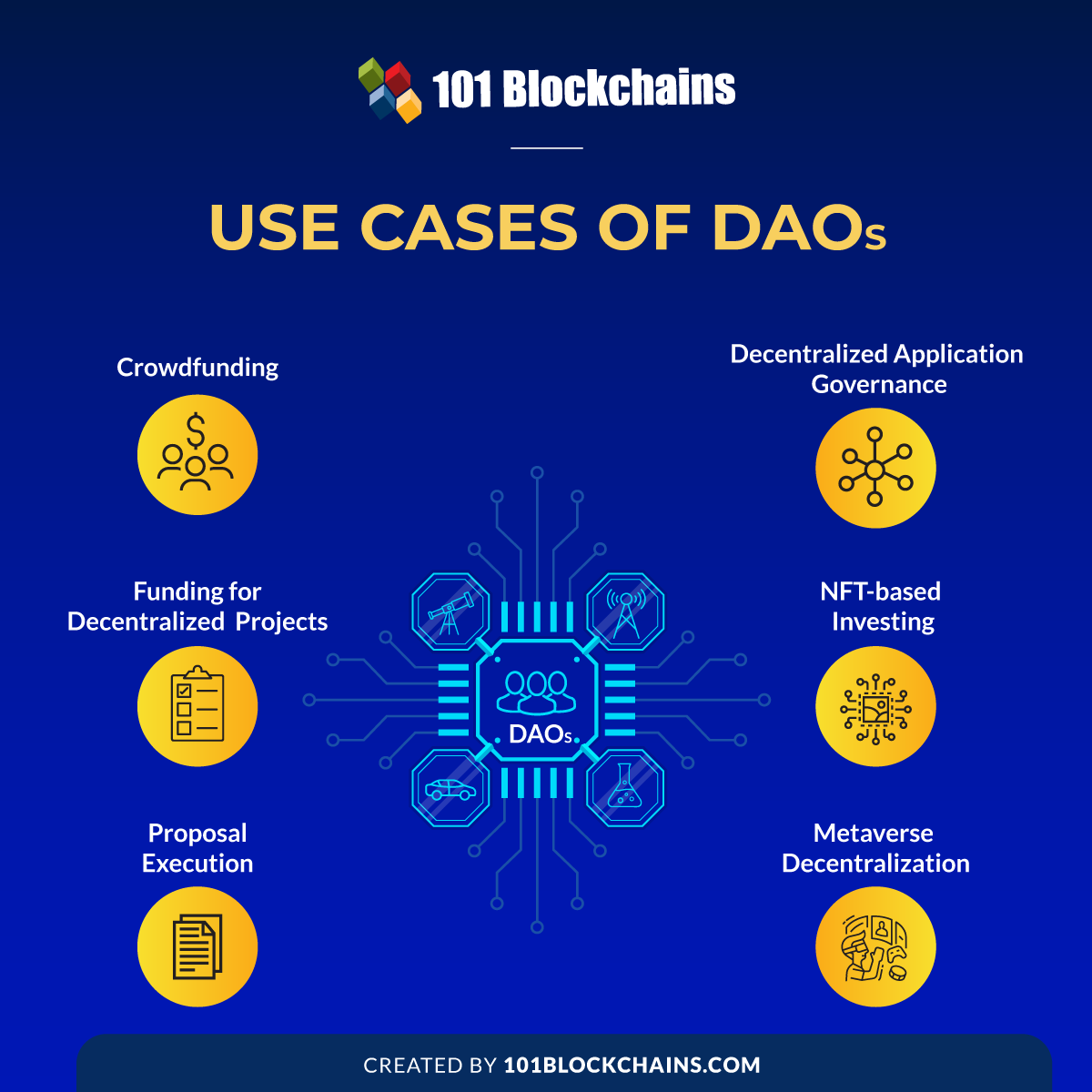
1. Proposal Execution
The first and foremost entry among top DAO use cases emerges from the facility for members to hold ‘shares’ in the organization. Members can use the shares as a representation of their voting rights and receive the necessary rewards for the same. One of the most renowned DAO examples, Curve DAO, has leveraged the Automated Market Maker model for offering rewards to token holders.
Therefore, people who hold their shares in the organization for a long time are more likely to receive rewards and voting rights. Voting rights can help members in determining the course of operations in the organization. Apart from the privileges for executing proposals, members can also participate in different activities such as rewarding and hiring employees.
2. Funding for Decentralized Projects
Another notable mention among best DAO use cases would obviously draw the limelight on raising funds for investment purposes or grants. The funds can be used for sponsoring decentralized applications and a completely new breed of crypto-related projects. MetaCartel Ventures is an example of a DAO use case for raising funds to invest in dApps.
Similarly, Moloch DAO and LAO are other popular decentralized autonomous organization examples showcasing the use of DAOs for raising investment funds to sponsor new projects. In such use cases, the DAOs help members in contributing funds and deciding the suitable projects for investment. Subsequently, members hold stakes in the projects and receive a share of profits from the project.
Excited to know about the top ten DAO tokens to invest in suitable projects? Check the detailed guide Now on Top 10 Decentralized Autonomous Organization (DAO) Tokens
3. Crowdfunding
DAOs can also serve value outside the world of blockchain and crypto by supporting crowdfunding initiatives. If you want to know “What can a DAO be used for?” you should also take note of how DAOs can help in crowdsourcing funds to support specific goals. The Constitutional DAO example is a glaring proof of how decentralized autonomous organizations can help in collecting funds for a particular project.
4. Decentralized Application Governance
One of the biggest answers to “what is the use of DAO” points to the possibility of dApp governance. As the DeFi ecosystem grows at a rapid pace, developers want to extend the decentralization aspect beyond the network level. DAOs can help app developers make users trust the platform rather than the developers. DAOs with dApps can support users in proposing changes to decentralized applications alongside allowing voting rights to token holders.
Want to learn and understand the scope and purpose of DeFi? Enroll Now in Introduction to Defi- Decentralized Finance Course
5. NFT-based Investing
The top DAO use cases also include the focus on NFT-based investing, which has started gaining momentum with the growth of the NFT market. Many NFT holders can stake their NFTs for voting and earning tokens as a representation of a single fraction of the group’s assets. One of the examples of DAOs for NFT-based investing is HeadDAO, in which members have collective ownership of blue-chip NFTs
6. Metaverse Decentralization
The discussions on “What can a DAO be used for?” would also focus on how they can support decentralization in the metaverse. Many metaverse platforms have used DAOs to facilitate decentralization by allowing members to vote on changes in the game and the overall ecosystem. For example, Decentraland DAO helps the members of the 3D world vote on different changes in the platform and its ecosystem.
Aspiring to Become a Certified Metaverse Expert? Enroll in Certified Metaverse Professional (CMP) Certification Course Now!
What Is An Example of a DAO?
The overview of decentralized autonomous organizations is practically incomplete without diving into examples. You must observe the examples of different types of DAOs to identify how they work in the real world. Here are some of the notable DAO examples in different categories.
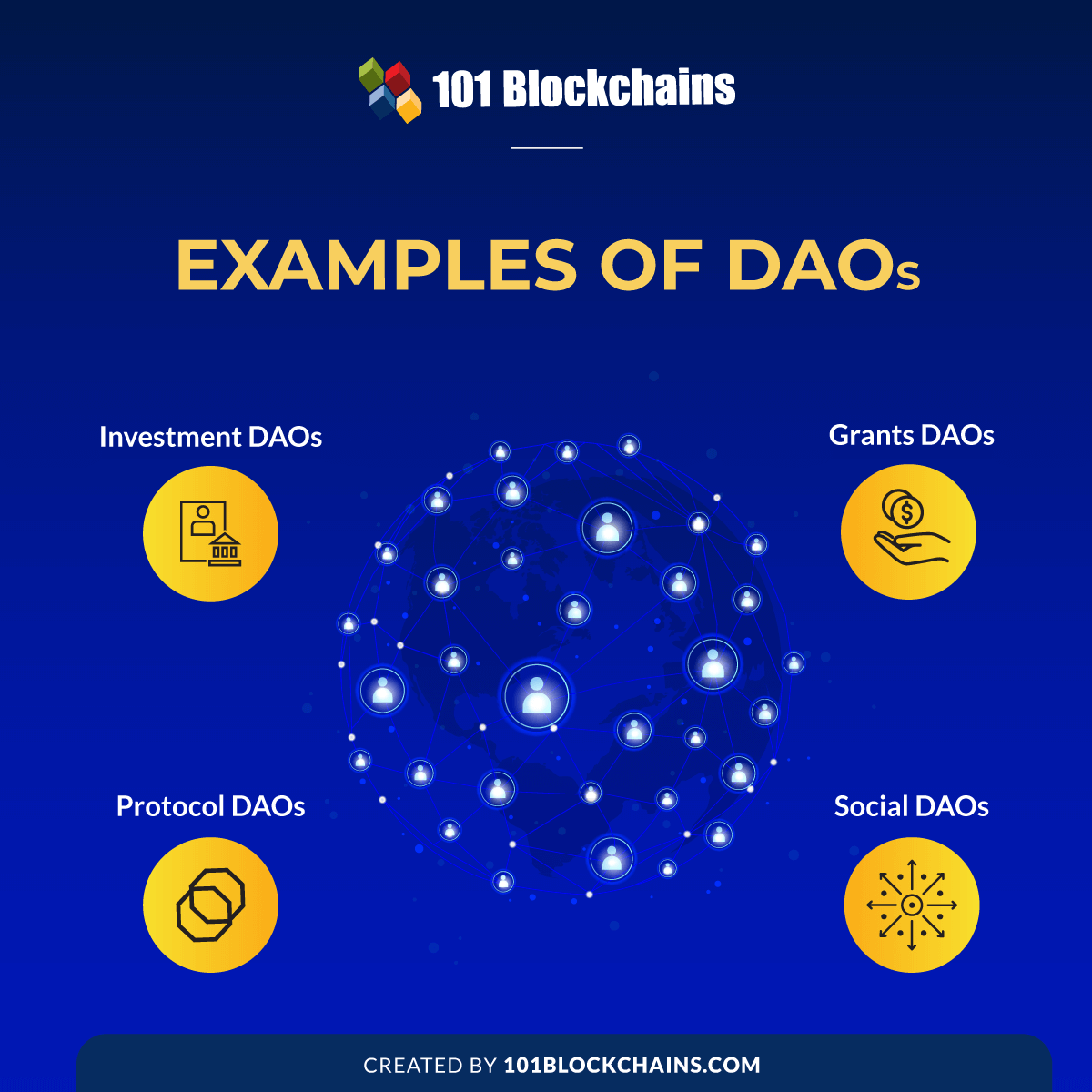
1. Protocol DAOs
The most common variant among DAOs refers to protocol DAOs, which offer an ownership and governance mechanism to support lending platforms. Here are the notable decentralized autonomous organization examples in protocol DAOs.
- Uniswap is one of the biggest Ethereum-based decentralized exchanges, developed with its own governance system and token.
- Aave, another decentralized platform, also leverages DAOs for governing platform decisions.
- MakerDAO, the original DAO in the DeFi world, has evolved as a governance mechanism for the popular DAI stablecoin.
2. Investment DAOs
Investment DAOs work like investment funds. Some of the top examples of investment DAOs include,
- LAO has been created as a member-governed venture capital fund along the lines of a DAO model.
- MetaCartel Ventures is a sub-DAO in the larger MetaCartel DAO, focused on investments in new dApp projects.
3. Grants DAOs
The next answer is “what is an example of a DAO?” which refers to Grant DAOs, tailored for funding new projects, generally in the DeFi ecosystem. Some popular examples of grants DAOs include the following,
- Uniswap Grants is a promising DAO system tailored for managing disbursals from the UNI Community Treasury to support new DeFi projects.
- Moloch is another top name among grants DAO examples, with a share-based model serving as the basic framework for many new DAOs in present times. Interestingly, Moloch DAO offers the basic design for a Minimum Viable DAO. Therefore, the DAO offers effective support for off-chain decision-making and simpler code.
4. Social DAOs
The outline of decentralized autonomous organization examples would also include social DAOs, one of the most privileged DAO groups. You can think of them as exclusive clubs where you can gain membership by purchasing a specific amount of DAO tokens.
- Bored Ape Yacht Club NFTs are one of the top examples of social DAOs. You can buy a BAYC NFT and become a member of an elite club with many celebrities. The NFTs link to a distinct ‘bored ape’ profile picture. As of now, Bored Ape Yacht Club is the actual DAO and governance aspect of the project in the pipeline. However, it fulfills the basic premise of a social DAO.
Build your identity as a certified blockchain expert with 101 Blockchains’ Blockchain Certifications designed to provide enhanced career prospects.
Final Words
The rapidly growing popularity of DAOs obviously draws attention to top DAO use cases and the best practices for leveraging them. Decentralized Autonomous Organizations have all the capabilities for replacing governance apps and investment groups with the power of decentralization. However, the notion of adopting DAOs on a large scale depends considerably on how you address the challenges with them. For example, everyone cannot write smart contracts or maintain them at scale.
On the other hand, many DAO projects have proved successful in the objectives of governance or pooling investments. The freedom from centralized management alongside the prospects for shaping up a new breed of crypto projects make DAOs more appealing. DAOs have proved successful in the DeFi space and can influence the future of crypto. The idea of decentralized governance with DAOs also solidifies the case for the future of DAOs. Learn more about decentralized autonomous organizations in detail and discover their true potential now.
*Disclaimer: The article should not be taken as, and is not intended to provide any investment advice. Claims made in this article do not constitute investment advice and should not be taken as such. 101 Blockchains shall not be responsible for any loss sustained by any person who relies on this article. Do your own research!



